Customer management software helps businesses manage and store customer data easily, quickly bring effective marketing campaigns and make decisions on customer market share policies in the era of global competition.
Choosing the right best CRM software is crucial to maximizing sales and building customer relationships. From lead generation to customer data management, the best CRM software can help you achieve your goals. In this article, I share and review over 12 of the best CRM software, along with my top picks, so you can choose the best one for you.
1- Salesforce
Keep growing with the world’s #1 AI CRM.
Key features:
- CRM Platform: Centralized system for managing customer relationships and data.
- Sales Cloud: Automates sales processes, lead tracking, and pipeline management.
- Marketing Cloud: Creates personalized marketing campaigns and tracks customer journeys.
- Service Cloud: Provides customer support tools like case management and live chat.
- Customization: Allows extensive customization and access to third-party apps via AppExchange.
2- Monday
Core solutions that span across your business. All on one platform.
Key features:
- Project Management: Streamlines task tracking, project planning, and workflow automation.
- Customizable Workflows: Allows users to tailor workflows and boards to fit specific project needs.
- Collaboration Tools: Facilitates team communication, file sharing, and real-time updates.
- Integration Capabilities: Connects with apps like Slack, Google Drive, and Zoom for seamless work management.
- Analytics & Reporting: Provides dashboards and reporting tools to track project performance and team productivity.
3- Pipedrive
The easy and effective CRM for closing deals
Key features:
- Sales Pipeline Management: Visualizes and tracks deals through every stage of the sales process.
- Activity Management: Schedules and monitors tasks, calls, and emails to stay on top of sales activities.
- Lead and Deal Tracking: Helps manage leads, track progress, and prioritize opportunities.
- Integrations: Connects with tools like Gmail, Zapier, and Slack for smoother workflows.
- Reporting & Analytics: Offers insights and customizable reports to measure sales performance and productivity.

ZENDESK – Best CRM Software:
Sell smarter, not harder, Our modern sales CRM frees you to maximize productivity, maintain pipeline visibility, and grow revenue.
#best CRM software FOR CUSTOMER SUPPORT
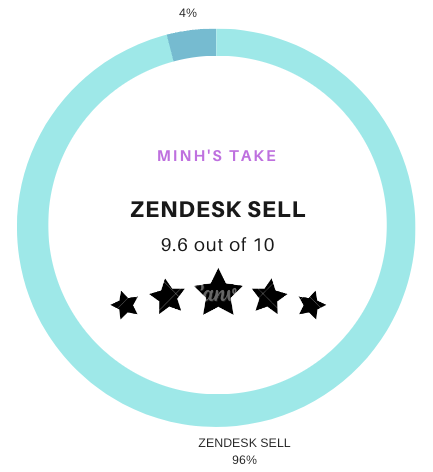
Starting price
$19 per user per month
Free Trial
14 days
Pipeline Management
Yes
On Zendesk’s Website
Why We Picked It
Zendesk Sell is best CRM software for businesses that need to provide customer support. It’s a best CRM software with integrated ticketing and help desk features, which allows you to manage customers from a single dashboard. You can track leads and opportunities in your pipeline, log communication history and assign tasks to collaborate with your team, as well as get real-time notifications when you receive an inquiry.
You can get a free trial for 14 days and pricing starts at $19 per user per month and goes up to $99 per user per month. Paid plans include features such as unlimited paid users, custom fields, reports and dashboards, team collaboration tools, advanced workflow automations and customer insights.
There are several reasons why a company may choose Zendesk Sell CRM as their preferred customer relationship management (best CRM software) solution. Here are some common reasons for choosing Zendesk Sell:
- User-Friendly Interface: Zendesk Sell CRM offers a user-friendly interface that is easy to navigate and understand. The platform provides a streamlined and intuitive experience, allowing users to quickly access and manage customer information, sales pipelines, and deal progress.
- Sales Pipeline Management: Zendesk Sell CRM provides robust sales pipeline management features, allowing sales teams to effectively track and manage their sales process from lead generation to deal closure. It offers visual representations of the sales pipeline, enabling salespeople to easily visualize and prioritize their activities.
- Contact Management: Zendesk Sell CRM offers comprehensive contact management capabilities, allowing users to store and organize customer information in a centralized database. Users can track and update contact details, communication history, and customer interactions, ensuring that important information is readily accessible.
- Reporting and Analytics: Zendesk Sell CRM provides powerful reporting and analytics features that enable users to gain insights into sales performance, deal progress, and team productivity. It offers customizable reports and dashboards, allowing sales managers to track key metrics, identify trends, and make data-driven decisions.
- Integration Capabilities: Zendesk Sell CRM integrates with a variety of other business tools and platforms, such as email clients, calendar applications, and marketing automation software. This integration capability ensures seamless data synchronization and collaboration across different systems, improving overall efficiency and productivity.
- Mobile Accessibility: Zendesk Sell CRM offers mobile applications for iOS and Android devices, allowing sales teams to access and update customer information on the go. This mobile accessibility enables salespeople to stay connected and responsive, even when they are away from their desks.
- Customer Support: Zendesk is well-known for its excellent customer support. They provide comprehensive resources, including documentation, knowledge base articles, and community forums. Additionally, they offer responsive customer support through various channels, ensuring that users receive prompt assistance when needed.
- Scalability and Customization: Zendesk Sell CRM is designed to scale with the growing needs of businesses. It offers customization options, allowing users to tailor the CRM to their specific requirements and workflows. This flexibility enables businesses to adapt the CRM to their unique sales processes and industry-specific needs.
It’s important to note that the choice of best CRM software depends on the specific needs and preferences of a company. Before selecting Zendesk Sell CRM or any CRM solution, it is recommended to evaluate multiple options, consider the specific requirements of the business, and assess how well the CRM aligns with the organization’s sales processes and goals.
Who should use it:
Zendesk Sell is best for businesses that need to provide customer support and need a ticketing system.
# Pros :
- Calendar integration
- Connect to Zendesk Support
- Call tracking and recording
# Cons :
- Automated distribution not available on lowest plan
- No free plan
- Clunky interface

ZOHO – Best CRM Software:
Sell smarter, not harder, Our modern sales CRM frees you to maximize productivity, maintain pipeline visibility, and grow revenue.
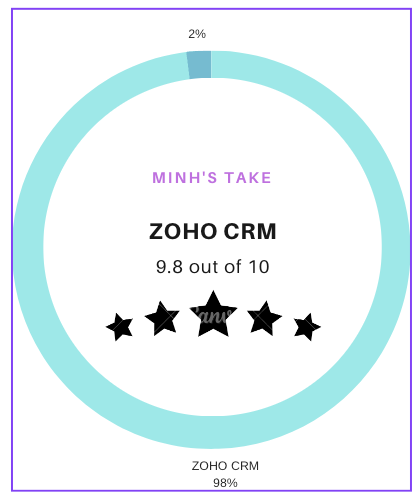
#best CRM software FOR STARTUPS
Starting price
Free; $14 per month (billed annually) or $20 per month (billed monthly)
Free Trial
15 days
Pipeline Management
Yes
Why We Picked It
Zoho CRM offers everything you need to manage your sales pipeline and grow your business. It allows businesses of all sizes to customize their process, create sales workflows and leverage powerful reporting. It also provides a full suite of apps that integrate with the platform for marketing, customer support, accounting, human resources and inventory management, provided you have a paid plan.
Monthly plans start at $20 per month and go up to $65 per month, with a sizeable discount if you sign up for a full year. There’s also a free option. The free basic plan is good for up to three users, so it’s best for small businesses and startups, and includes leads, deals, contact management, tasks, events, Zoho app integrations and multichannel marketing.
Paid plans include features such as custom dashboards, inventory management, advanced customization and scoring rules. You can also create a mobile app for your business in minutes using Zoho Creator. It allows you to access your business data from anywhere, directly from your Android and iOS devices.
Who should use it:
Zoho CRM is best CRM software for startups and small businesses because of its sales workflows and pay-as-you-go pricing.
There are several reasons why a company may choose Zoho best CRM software as their preferred customer relationship management (CRM) solution. Here are some common reasons for choosing Zoho CRM:
- Comprehensive Feature Set: Zoho CRM offers a wide range of features to manage customer relationships effectively. It provides tools for contact and lead management, sales pipeline tracking, email marketing, analytics, workflow automation, and more. The comprehensive feature set ensures that businesses can streamline their sales and marketing processes within a single platform.
- Integration Capabilities: Zoho CRM integrates seamlessly with other popular business tools and platforms, such as email clients, calendar applications, document management systems, and marketing automation software. This integration capability allows for efficient data sharing, collaboration, and workflow automation across different systems.
- Customization Options: Zoho CRM offers extensive customization options, allowing businesses to tailor the CRM to their specific needs and industry requirements. Users can customize fields, layouts, modules, and workflows to match their unique sales processes. This flexibility ensures that the CRM adapts to the organization’s workflows rather than the other way around.
- Scalability: Zoho CRM is designed to accommodate the growth and changing needs of businesses. It offers scalable pricing plans and the ability to add or remove users as required. As a company expands, Zoho CRM can easily scale to support the increasing customer base and sales operations.
- Mobile Accessibility: Zoho CRM provides mobile applications for iOS and Android devices, enabling sales teams to access customer information, update records, and track sales activities on the go. The mobile accessibility feature ensures that salespeople can stay productive and connected while working remotely or in the field.
- Advanced Analytics and Reporting: Zoho CRM offers powerful analytics and reporting capabilities, providing insights into sales performance, lead conversion rates, customer behavior, and more. Users can create custom reports, dashboards, and charts to track key metrics and make data-driven decisions to optimize their sales processes.
- Customer Support: Zoho is known for its dedicated customer support. They provide comprehensive resources, including documentation, knowledge base articles, and community forums. Additionally, they offer responsive customer support through various channels, ensuring that users receive assistance when needed.
- Affordability: Zoho CRM offers pricing plans suitable for businesses of all sizes, including small and medium-sized enterprises. The flexible pricing options make it an affordable CRM solution compared to some other enterprise-level CRM providers.
It’s important for businesses to carefully evaluate their specific needs, industry requirements, and budget considerations when choosing a best CRM software. Zoho CRM provides a robust set of features, customization options, scalability, and integration capabilities that make it a popular choice for many companies seeking an effective CRM solution.
# Pros :
- Offers a free plan
- No contracts
- Streamlined user interface
# Cons :
- Free plan doesn’t include third-party integrations, just Zoho apps
- Must pay for Premium and Enterprise support

INSIGHTLY -Best CRM Software:
Modern, scalable CRM your teams will love.Try Insightly. It’s simple to set up, integrates easily,
and is built to support your growth.
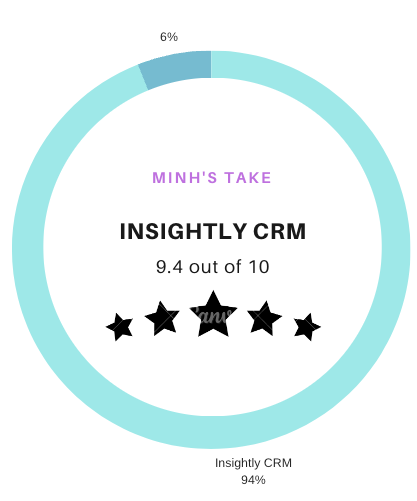
#best CRM software FOR PROJECT MANAGEMENT
Starting price
$29 per user per month
Free Trial
14 days
Pipeline Management
Yes
Why We Picked It
Insightly is best CRM software for small businesses that need to manage projects. It allows you to keep a pulse on your sales pipeline and project progress with its Gantt chart view, as well as track time and expenses. You can also create custom fields, import data from other apps and set up automatic reminders to follow up with leads.
You can get a free trial for 14 days, and pricing starts at $29 per user per month and goes up to $99 per user per month, paid annually. Plans include features such as advanced reporting, automation rules, custom branding, data import, and project management and delivery.
Who should use it:
Insightly is best for small businesses that need to manage projects and want to track their sales pipeline.
Read more:
There are several reasons why a company may choose Insightly best CRM software as their preferred customer relationship management (CRM) solution. Here are some common reasons for choosing Insightly CRM:
- User-Friendly Interface: Insightly CRM offers a user-friendly interface that is intuitive and easy to navigate. The platform provides a clean and organized layout, making it simple for users to access and manage customer information, tasks, and sales opportunities.
- Contact and Relationship Management: Insightly CRM excels in contact and relationship management. It allows businesses to store and organize detailed customer profiles, including contact information, communication history, and social media profiles. Users can easily track interactions with customers, ensuring that important details are captured and accessible.
- Project and Task Management: Insightly CRM integrates project and task management features, enabling businesses to streamline their workflow and collaborate effectively. Users can create projects, assign tasks, set deadlines, and track progress, ensuring that team members stay organized and productive.
- Sales Pipeline and Opportunity Tracking: Insightly CRM provides robust sales pipeline management capabilities. Users can track leads, monitor sales opportunities, and visualize the entire sales process. This helps sales teams prioritize their efforts, forecast revenue, and identify areas for improvement.
- Customization Options: Insightly CRM offers customization options to tailor the CRM to specific business needs. Users can customize fields, layouts, and workflows, ensuring that the CRM aligns with their unique sales processes and terminology.
- Email Integration: Insightly CRM integrates seamlessly with email clients, allowing users to track email communications directly within the CRM. This feature helps sales teams stay organized, maintain a complete communication history, and follow up on important emails.
- Reporting and Analytics: Insightly CRM provides reporting and analytics features to track key performance metrics and gain actionable insights. Users can generate reports, create dashboards, and visualize data, enabling data-driven decision-making and performance monitoring.
- Integration Capabilities: Insightly CRM integrates with popular business tools and platforms, such as email marketing software, project management tools, and accounting systems. This integration capability allows for data synchronization, streamlined workflows, and enhanced productivity.
- Mobile Accessibility: Insightly CRM offers mobile applications for iOS and Android devices, enabling users to access and update customer information on the go. This mobile accessibility ensures that sales teams can stay connected and productive while working remotely or traveling.
- Affordable Pricing: Insightly CRM offers affordable pricing plans suitable for small and medium-sized businesses. It provides a range of features and scalability options without breaking the budget.
When selecting a best CRM software, it’s important for businesses to assess their specific needs, industry requirements, and consider how well the CRM aligns with their workflows and goals. Insightly CRM offers a user-friendly interface, contact management capabilities, project and task management features, customization options, and integration capabilities that make it a viable choice for many organizations.
# Pros :
- Project management and delivery
- Lead management
- Opportunity management
- Lead assignment and tracking
- Track milestones
- Customizable reports
# Cons :
- No lead assignment and routing in Plus plan
- Can only schedule outbound emails with Professional or Enterprise plans
- More expensive than alternatives

NutSHELL -Best CRM Software:
Simple, affordable CRM your team will love, Built for growing businesses,
- Contact management that is simple and intuitive, not complicated
- Easily automate your sales process and reduce manual entries
- Email directly from Nutshell instead of constantly switching tabs
- Customize your dashboard to what matters to you
- Easy to use reports to improve your process
- Free Live Support offered to all CRM users (even during your Free Trial)
best CRM software for Team Adoption.
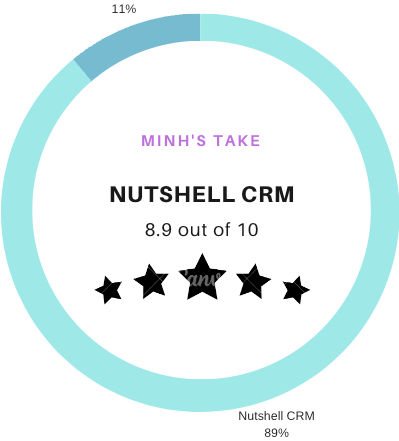
Starting price
$42 per user per month (Pro)CRM, sales automation, and advanced reporting to help your team maximize every opportunity.
Free Trial
14 days
Pipeline Management
Yes
On Nutshell’s Website
Why We Picked It
Here are a few key factors that may have influenced the decision:
- Ease of Use: Nutshell CRM offers a user-friendly interface that is easy to navigate and understand. This simplicity makes it easier for employees to adopt and use the CRM effectively, reducing training time and increasing user adoption rates within the company.
- Comprehensive Features: Nutshell CRM provides a comprehensive set of features that cover the essential aspects of customer relationship management. It offers functionalities such as contact management, sales pipeline tracking, task management, email integration, reporting, and more. This ensures that all necessary tools and capabilities are available within a single platform, eliminating the need for additional software or tools.
- Customization Options: Nutshell CRM allows companies to customize the system to align with their specific needs and workflows. Businesses can create custom fields, define sales stages, set up automation rules, and tailor the CRM to match their unique sales processes. This flexibility ensures that Nutshell CRM adapts to the company’s requirements rather than forcing the company to conform to the CRM’s limitations.
- Integration Capabilities: Nutshell CRM offers seamless integration with other popular business tools and software. It can integrate with email platforms, calendar applications, marketing automation tools, customer support systems, and more. This integration capability allows for a streamlined workflow and ensures that data flows seamlessly between different systems, reducing manual data entry and improving efficiency.
- Mobile Accessibility: Nutshell CRM provides mobile applications for iOS and Android devices, enabling users to access their CRM data and perform essential tasks on the go. This mobility ensures that sales representatives and other employees can stay connected and productive even when they are away from their desks or in the field.
- Customer Support: Nutshell CRM offers reliable customer support to assist users with any inquiries or technical issues they may encounter. The support team is responsive and knowledgeable, providing timely assistance and ensuring that companies receive the necessary support to maximize their CRM usage.
There are several reasons why a company may choose Nutshell best CRM software as their preferred customer relationship management (CRM) solution. Here are a few key reasons:
- User-Friendly Interface: Nutshell CRM offers a user-friendly interface that is intuitive and easy to navigate. This makes it simple for employees to adopt and use the CRM system effectively, minimizing the learning curve and increasing user adoption rates within the company.
- All-in-One Solution: Nutshell CRM provides a comprehensive set of features and functionalities, serving as an all-in-one solution for sales, customer support, and marketing teams. It offers contact management, pipeline management, email integration, task management, reporting, and more. This eliminates the need for multiple tools or software, streamlining processes and increasing efficiency.
- Customization Options: Nutshell CRM allows companies to customize the system to align with their specific needs and workflows. Businesses can tailor the CRM to match their unique sales processes, create custom fields and data sets, and configure automation rules. This flexibility ensures that Nutshell CRM adapts to the company’s requirements rather than forcing the company to adapt to the CRM.
- Sales Pipeline Management: Nutshell CRM provides robust sales pipeline management capabilities, allowing companies to track and manage their sales opportunities effectively. It enables sales teams to visualize their sales process, track deal stages, assign tasks, and set reminders. This helps improve sales efficiency, identify bottlenecks, and ensure timely follow-ups with prospects.
- Integration Capabilities: Nutshell CRM offers seamless integration with various popular business tools and software, such as email platforms, calendar applications, customer support systems, and marketing automation platforms. This integration enables companies to streamline their workflows, sync data across different systems, and maintain consistency in customer information.
- Mobile Accessibility: Nutshell CRM provides mobile applications for iOS and Android devices, allowing users to access their CRM data and perform essential tasks on the go. This mobility ensures that sales reps can access customer information, update records, and manage their pipelines even when they are out of the office.
- Customer Support: Nutshell CRM offers reliable customer support to assist users with any inquiries or issues they may encounter. The support team is responsive and provides timely assistance, ensuring that companies receive the necessary support to maximize their CRM usage.
Nutshell best CRM software is chosen by companies for its user-friendly interface, comprehensive features, customization options, sales pipeline management capabilities, integration capabilities, mobile accessibility, and reliable customer support. These factors contribute to enhanced sales processes, improved productivity, and better customer relationship management for businesses of all sizes.
Who should use it:
Nutshell CRM is suitable for a range of businesses and professionals who are focused on managing and growing their customer relationships. Here are some examples of who should consider using Nutshell CRM:
- Sales Teams: Nutshell CRM is particularly well-suited for sales teams in various industries. Whether you’re managing a small sales team or a larger department, Nutshell CRM provides the tools to streamline sales processes, track leads and opportunities, and monitor sales performance. It helps sales teams stay organized, collaborate effectively, and close deals more efficiently.
- Customer Support Teams: Companies with dedicated customer support teams can benefit from Nutshell CRM’s features for managing customer interactions and inquiries. It enables support agents to access customer history, track support tickets, and provide timely responses. Nutshell CRM helps improve response times, enhance customer satisfaction, and maintain effective communication with customers.
- Small and Medium-Sized Businesses (SMBs): Nutshell CRM caters well to the needs of small and medium-sized businesses. It offers a comprehensive set of features without the complexity and high costs associated with larger enterprise CRM systems. SMBs can leverage Nutshell CRM to centralize customer data, track sales activities, and optimize their sales processes while staying within budget.
- Startups and Entrepreneurial Ventures: Nutshell CRM is an excellent choice for startups and entrepreneurial ventures that are looking to establish effective sales processes and manage customer relationships from the outset. It provides the necessary tools to organize leads, track sales activities, and nurture customer relationships, helping startups build a strong foundation for future growth.
- Marketing Professionals: Nutshell CRM can also be beneficial for marketing professionals who want to align their marketing efforts with sales and customer data. By integrating Nutshell CRM with marketing automation platforms, marketers can gain insights into lead behavior, track campaign effectiveness, and analyze the sales pipeline. This integration enables marketing teams to refine their strategies, deliver targeted campaigns, and generate higher-quality leads.
- Freelancers and Independent Professionals: Even individual professionals and freelancers can utilize Nutshell CRM to manage their client relationships effectively. Nutshell CRM helps track client communications, set reminders for follow-ups, and maintain a centralized database of client information. This allows freelancers to stay organized, provide better service to clients, and foster long-term relationships.
# Pros:
- User-Friendly Interface: Nutshell CRM has an intuitive and user-friendly interface, making it easy for users to navigate and adopt.
- Comprehensive Features: Nutshell CRM offers a wide range of features that cover contact management, sales pipeline tracking, task management, email integration, reporting, and more, providing a holistic CRM solution.
- Customization Options: Nutshell CRM allows businesses to customize the system to match their specific needs and workflows, ensuring it aligns with their unique processes.
- Integration Capabilities: Nutshell CRM seamlessly integrates with popular business tools and software, enabling data synchronization and streamlining workflows across different systems.
- Mobile Accessibility: Nutshell CRM provides mobile applications for iOS and Android devices, allowing users to access CRM data and perform tasks on the go.
- Customer Support: Nutshell CRM offers reliable customer support, providing timely assistance and resolving issues to ensure a smooth user experience.
# Cons:
- Advanced Reporting Limitations: While Nutshell CRM offers reporting features, some users may find the advanced reporting capabilities to be limited compared to more specialized reporting tools.
- Limited Marketing Automation: Nutshell CRM focuses primarily on sales and customer management, so its marketing automation capabilities may not be as robust as dedicated marketing automation platforms.
- Integration Restrictions: Although Nutshell CRM offers integration with popular tools, there may be certain niche or industry-specific software that may not have direct integrations available.
- Learning Curve for Complex Configurations: Customizing and configuring Nutshell CRM for complex sales processes or unique requirements may require a learning curve and technical expertise.

FRESHWORKS -Best CRM Software:
A powerful Sales CRM that helps you sell smarter and close deals faster, Drive productivity and revenue growth with the ultimate sales tech stack
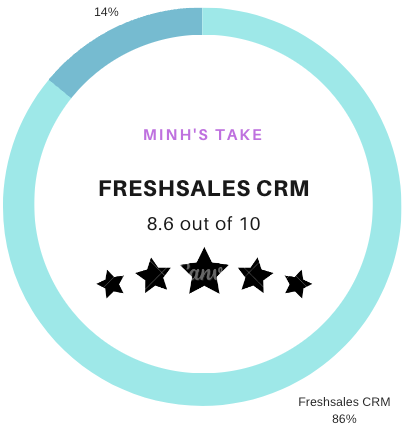
#best CRM software for Build a high-performing sales team and grow your revenue
Starting price
Free; $39 per month (billed annually) or $47 per month (billed monthly) , Everything you need to manage multiple sales teams and grow revenue like a pro
Free Trial
15 days
Pipeline Management
Yes
Why We Picked It
There can be several reasons why a company may choose Freshworks CRM as their preferred CRM solution. Here are some potential factors that may have influenced the decision:
- Comprehensive Feature Set: Freshworks CRM offers a wide range of features that cover various aspects of customer relationship management. From lead management and contact organization to sales automation and analytics, Freshworks CRM provides a comprehensive set of tools to support sales and marketing teams.
- User-Friendly Interface: Freshworks CRM is known for its intuitive and user-friendly interface. The platform is designed to be easy to navigate and understand, which reduces the learning curve for employees and promotes higher adoption rates within the organization.
- Integration Capabilities: Freshworks CRM integrates seamlessly with a variety of third-party applications and tools. This integration ecosystem allows businesses to connect their CRM with other software they use, such as email marketing platforms, customer support systems, and productivity tools. The ability to integrate with existing systems enhances efficiency and productivity by streamlining workflows and eliminating manual data entry.
- Scalability: Freshworks CRM is suitable for businesses of all sizes, from small startups to large enterprises. The platform offers scalability, allowing companies to start with the features they need and expand as their requirements grow. This flexibility ensures that Freshworks CRM can adapt to the changing needs of the business over time.
- Customization Options: Freshworks CRM provides customization options that enable businesses to tailor the platform to their specific processes and workflows. Companies can create custom fields, define sales stages, set up automation rules, and configure the CRM to align with their unique requirements. This level of customization ensures that Freshworks CRM can accommodate the specific needs of the organization.
- Customer Support: Freshworks is known for its excellent customer support. The company offers various support channels, including live chat, phone, and email, to assist users with any inquiries or technical issues they may encounter. Having reliable customer support ensures that businesses receive the necessary assistance to maximize their usage of Freshworks CRM.
- Pricing: Freshworks CRM offers competitive pricing plans suitable for businesses of different sizes and budgets. The pricing structure is transparent and flexible, allowing companies to choose the plan that aligns with their needs and financial resources. The affordability of Freshworks CRM makes it an attractive option, especially for small and medium-sized businesses.
Ultimately, the decision to pick Freshworks best CRM software may have been influenced by its comprehensive feature set, user-friendly interface, integration capabilities, scalability, customization options, reliable customer support, and competitive pricing. These factors collectively contribute to a CRM solution that can effectively support the company’s sales and marketing efforts, improve customer relationships, and drive business growth.
What are several reasons why a company may choose Freshworks CRM?
A company may choose Freshworks best CRM software for several reasons, as it offers a range of benefits and features that cater to various business needs. Here are some key reasons why a company might choose Freshworks CRM:
- Unified Customer Data: Freshworks CRM provides a centralized platform to manage all customer-related information, including contacts, interactions, deals, and communication history. Having a unified view of customer data enables teams to make informed decisions and deliver personalized experiences.
- Easy-to-Use Interface: Freshworks CRM boasts an intuitive and user-friendly interface that requires minimal training for users to get started. This ease of use ensures quick adoption and seamless integration into existing workflows.
- Sales Automation: The CRM platform offers sales automation features such as lead scoring, auto-assignment of leads, email tracking, and automated workflows. These automation capabilities help sales teams streamline their processes, save time, and focus on high-value activities.
- Email Integration: Freshworks CRM integrates with popular email providers, allowing users to manage their email communication directly within the CRM platform. This feature facilitates efficient communication tracking and follow-up management.
- Sales Performance Analytics: The CRM’s built-in analytics and reporting tools provide valuable insights into sales performance, deal progress, and team productivity. These analytics enable data-driven decision-making and help identify areas for improvement.
- Customization and Scalability: Freshworks CRM can be easily customized to suit the specific needs and workflows of different businesses. Additionally, it offers scalability to accommodate the growth and changing requirements of a company.
- Multi-Channel Communication: Freshworks CRM supports communication across multiple channels, including phone, email, chat, and social media. This capability allows businesses to engage with customers through their preferred channels.
- Integration Ecosystem: Freshworks CRM offers integrations with a wide range of third-party applications, such as marketing automation tools, customer support platforms, and productivity software. This integration ecosystem enhances the CRM’s functionality and improves cross-functional collaboration.
- Excellent Customer Support: Freshworks is known for its customer-centric approach, offering reliable and responsive customer support. Their support team ensures that users receive timely assistance and resolution for any issues they encounter.
- Affordable Pricing: Freshworks CRM provides different pricing plans suitable for businesses of various sizes and budgets. This affordability makes it an attractive choice, especially for small and medium-sized enterprises.
In summary, a company may choose Freshworks CRM for its unified customer data management, user-friendly interface, sales automation, email integration, sales performance analytics, customization options, multi-channel communication, integration ecosystem, customer support, and cost-effectiveness. These factors collectively contribute to a comprehensive CRM solution that empowers businesses to improve customer relationships, streamline sales processes, and drive growth.
Who should use it:
Freshworks CRM is a versatile best CRM software solution that can benefit a wide range of businesses across various industries. Here are some key users who can benefit from using Freshworks CRM:
- Sales Teams: Freshworks CRM is designed to empower sales teams by providing them with the tools and features needed to manage leads, track customer interactions, automate sales processes, and close deals. Sales representatives can effectively manage their pipeline, track sales activities, and collaborate with team members to improve sales performance and drive revenue.
- Marketing Teams: Marketing professionals can leverage Freshworks CRM to gain insights into customer behavior, track marketing campaigns, and nurture leads. The CRM’s integration with marketing automation tools enables seamless coordination between marketing activities and sales efforts, ensuring a cohesive and targeted approach to customer engagement.
- Customer Support Teams: Freshworks CRM enables customer support teams to streamline their operations by centralizing customer information, tracking support tickets, and managing customer communication. Support agents can efficiently handle customer inquiries, provide personalized support, and maintain a complete history of customer interactions for improved service delivery.
- Small and Medium-Sized Businesses (SMBs): Freshworks CRM offers affordable pricing plans and a user-friendly interface, making it an ideal choice for SMBs with limited resources. It provides the necessary tools to effectively manage customer relationships, streamline sales processes, and drive growth without the need for a complex and expensive CRM system.
- Business Owners and Managers: Freshworks CRM provides business owners and managers with valuable insights into sales performance, team productivity, and customer engagement. The CRM’s analytics and reporting features allow decision-makers to make data-driven decisions, identify trends, and implement strategies to optimize sales and customer relationship management.
- E-commerce Businesses: Freshworks CRM offers specific features tailored for e-commerce businesses, such as website visitor tracking, cart abandonment tracking, and order management. These features enable online retailers to effectively track customer behavior, analyze purchase patterns, and personalize marketing and sales efforts to maximize conversions.
- Service-Based Industries: Businesses in service-based industries, such as consulting firms, agencies, and professional services, can benefit from Freshworks CRM’s ability to track client interactions, manage service contracts, and automate billing processes. The CRM streamlines service delivery, improves client satisfaction, and enhances project management efficiency.
In summary, Freshworks best CRM software is suitable for sales teams, marketing teams, customer support teams, SMBs, business owners, e-commerce businesses, and service-based industries. Its versatility, user-friendly interface, and robust feature set make it a valuable tool for businesses looking to streamline their customer relationship management processes, enhance team collaboration, and drive business growth.
Pros of Freshworks CRM:
- Comprehensive Feature Set: Freshworks CRM offers a wide range of features, including contact management, lead scoring, sales automation, email marketing, reporting, and more. This comprehensive feature set covers all aspects of customer relationship management, enabling businesses to effectively manage their sales and marketing processes.
- User-Friendly Interface: Freshworks CRM has an intuitive and user-friendly interface, making it easy for users to navigate and understand. The platform’s clean design and well-organized layout contribute to a positive user experience and minimize the learning curve for new users.
- Customization Options: Freshworks CRM provides robust customization options, allowing businesses to tailor the CRM to their specific needs and workflows. Users can create custom fields, define sales stages, set up automation rules, and configure the CRM to align with their unique processes, ensuring a personalized CRM experience.
- Integration Capabilities: Freshworks CRM seamlessly integrates with popular third-party applications, such as email marketing tools, customer support software, and productivity apps. This integration capability enables businesses to streamline their workflows, eliminate data silos, and maintain consistency across their tech stack.
- Scalability: Freshworks CRM is scalable, making it suitable for businesses of all sizes. Whether you’re a small startup or a large enterprise, the CRM can accommodate your growing needs and adapt as your business expands, ensuring long-term scalability.
- Automation and Productivity Features: Freshworks CRM offers automation features that help streamline sales and marketing processes, saving time and increasing productivity. From automated lead assignment and email workflows to task reminders and notifications, these features enable teams to focus on high-value activities and improve efficiency.
Cons of Freshworks CRM:
- Advanced Features Limited to Higher Tiers: Some advanced features, such as advanced reporting and territory management, are only available in the higher-tier plans. This can limit access to certain functionalities for businesses on lower-tier plans with more specific needs.
- Learning Curve for Complex Workflows: While the user interface is generally user-friendly, more complex workflows and customization may require a learning curve. Users with specific requirements may need to invest time and resources in setting up and configuring the CRM to meet their specific needs.
- Limited Native Integrations: Although Freshworks CRM offers integrations with popular third-party applications, the number of native integrations available is not as extensive compared to some other CRM platforms. Businesses with unique integration requirements may need to explore custom solutions or consider alternative CRM options.
- Mobile App Functionality: While Freshworks CRM offers a mobile app, the functionality and user experience may not be as robust as the web version. Some users may find the mobile app lacking certain features or experiencing occasional performance issues.
- Pricing for Additional Users: Freshworks CRM’s pricing structure includes a per-user cost, which can become a significant factor as your team grows. Adding new users can result in increased costs, especially for businesses with a large sales or support team.

COPPER – Best CRM Software:
You live in Google Workspace.
So should your CRM.
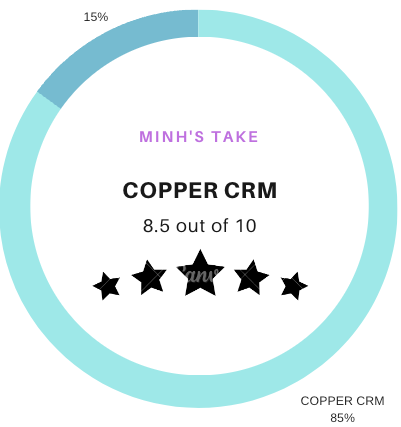
#best CRM software for Google Workspace
Build better relationships and win more customers with Copper + Google.
Starting price
$59 per user per month For Professional (Annual)Our most popular plan for growing businesses includes workflow automation and integrations with your go-to tools.
Free Trial
14 days
Pipeline Management
Yes
What are several reasons why a company may choose COPPER CRM?
There are several reasons why a company may choose Copper CRM as their customer relationship management solution. Here are some key reasons:
- Seamless Integration with Google Workspace: Copper CRM is designed specifically for businesses using Google Workspace (formerly G Suite). It integrates seamlessly with Gmail, Google Calendar, and Google Drive, allowing users to manage customer relationships directly within their Google Workspace environment. This integration enables a smooth workflow, eliminates the need for data duplication, and provides a unified platform for communication and collaboration.
- User-Friendly Interface: Copper CRM offers a clean and intuitive interface that is easy to navigate, making it user-friendly for both new and experienced users. The platform follows Google’s Material Design principles, providing a familiar and cohesive experience for users who are already accustomed to Google’s interface.
- Automated Data Entry: Copper CRM automates data entry by capturing information from emails and other communications, reducing manual data entry tasks for sales and support teams. It automatically associates emails and contacts with relevant deals or leads, saving time and ensuring data accuracy.
- Relationship-Building Focus: Copper CRM puts a strong emphasis on relationship building and fostering meaningful connections with customers. It provides a 360-degree view of customer interactions, tracks communication history, and provides insights into relationship strength. This enables businesses to personalize their interactions, understand customer needs, and build stronger customer relationships.
- Sales Productivity Features: Copper CRM offers a range of sales productivity features to help sales teams streamline their processes and improve efficiency. This includes features like deal management, pipeline tracking, task management, and sales reporting. By providing visibility into the sales pipeline and automating repetitive tasks, Copper CRM helps sales teams focus on closing deals and driving revenue.
- Customization and Scalability: Copper CRM allows businesses to customize and adapt the CRM to their specific needs. Users can create custom fields, workflows, and automation rules to align with their unique sales processes. The platform is also scalable, making it suitable for businesses of all sizes, from small startups to large enterprises.
- Collaboration and Teamwork: Copper CRM facilitates collaboration and teamwork through features like shared inboxes, team visibility into customer interactions, and the ability to assign and track tasks. This promotes effective communication and coordination among team members, leading to improved collaboration and productivity.
- Reporting and Analytics: Copper CRM provides robust reporting and analytics capabilities, offering insights into sales performance, team productivity, and customer engagement. Users can generate customizable reports, track key metrics, and gain actionable insights to make data-driven decisions.
Why We Picked It
Customers may choose to use Copper best CRM software for several reasons:
- Improved Customer Relationships: Copper CRM enables customers to manage their interactions with clients more effectively. It provides a centralized platform to store customer information, communication history, and notes, allowing for a comprehensive view of customer interactions. This helps in building stronger relationships, delivering personalized experiences, and providing better customer service.
- Streamlined Sales Processes: Copper CRM offers features that streamline sales processes, making it easier for customers to manage their sales pipelines, track leads, and close deals. It provides a visual representation of the sales pipeline, automates repetitive tasks, and offers reminders and notifications for important follow-ups. This helps customers optimize their sales workflows and improve sales productivity.
- Enhanced Team Collaboration: Copper CRM promotes collaboration among team members by providing shared inboxes, task assignments, and real-time visibility into customer interactions. This enables teams to work together more efficiently, share information, and collaborate on deals and projects. Improved collaboration leads to better teamwork and more successful outcomes.
- Time and Efficiency Savings: Copper CRM automates manual data entry tasks by capturing information from emails and other communication channels. This saves time and reduces the risk of errors that can occur with manual data entry. Additionally, features like email templates, document management, and task automation help customers streamline their processes and increase efficiency.
- Data-driven Insights: Copper CRM provides reporting and analytics capabilities that allow customers to gain insights into their sales performance, team productivity, and customer engagement. It offers customizable reports and dashboards, which help customers track key metrics, identify trends, and make data-driven decisions to improve their business strategies.
- Seamless Integration: Copper CRM integrates with other popular business tools and platforms, such as Google Workspace (formerly G Suite), allowing for seamless data synchronization and workflow integration. This ensures a smooth and connected experience across different systems, reducing the need for manual data transfer and improving overall productivity.
- Scalability and Customization: Copper CRM is designed to be scalable and adaptable to different business needs. It can accommodate the growth of a business and offers customization options to tailor the CRM to specific requirements. Customers can customize fields, workflows, and automation rules to align with their unique processes and workflows.
Customers use Copper best CRM software to enhance customer relationships, streamline sales processes, improve team collaboration, save time and increase efficiency, gain data-driven insights, benefit from seamless integrations, and have the flexibility to scale and customize the CRM according to their specific needs.
Who should use it:
Copper best CRM software is suitable for a wide range of businesses and professionals who are looking to enhance their customer relationship management and sales processes. Here are some examples of who should use Copper CRM:
- Small and Medium-sized Businesses (SMBs): Copper CRM is well-suited for SMBs that want a user-friendly and affordable CRM solution. It provides the necessary tools to manage customer relationships, track sales activities, and streamline workflows, without requiring extensive technical knowledge or resources.
- Sales Teams: Sales teams of any size can benefit from using Copper CRM. It offers features to manage leads, track opportunities, and monitor the sales pipeline. Sales representatives can leverage the CRM’s functionalities to improve their sales productivity, collaborate with team members, and close deals more effectively.
- Customer Support and Service Teams: Copper CRM can be valuable for customer support and service teams. It allows them to centralize customer information, track support tickets, and maintain a comprehensive history of customer interactions. This helps in providing timely and personalized support, resolving issues efficiently, and maintaining customer satisfaction.
- Freelancers and Solopreneurs: Individuals operating as freelancers or solopreneurs can use Copper CRM to manage their client relationships and sales activities. It offers a simplified and intuitive interface, making it easy for individuals to track leads, manage contacts, and organize their sales efforts in a single platform.
- Professional Service Providers: Professionals such as consultants, agencies, and service providers can utilize Copper CRM to manage their client engagements and projects. It provides features for tracking project milestones, recording client communications, and generating reports. This helps professionals stay organized, deliver high-quality services, and maintain client satisfaction.
- Relationship-focused Businesses: Businesses that prioritize building and nurturing strong customer relationships can leverage Copper CRM’s relationship-centric approach. It provides tools for storing and accessing customer data, tracking interactions, and personalizing communication. This is particularly beneficial for businesses in industries where maintaining long-term customer relationships is essential.
- Teams that Rely on Google Workspace: Copper CRM seamlessly integrates with Google Workspace, making it a suitable choice for teams that heavily rely on Google apps like Gmail, Calendar, and Drive. The integration allows for automatic data syncing, email tracking, and easy access to customer information within the familiar Google Workspace environment.
Ultimately, Copper best CRM software is versatile and can be used by various professionals and businesses across different industries. Whether you are a small business owner, sales representative, customer support agent, freelancer, or service provider, Copper best CRM software can help you streamline your customer management and sales processes, improve collaboration, and drive business growth.
Pros of using Copper CRM:
- User-Friendly Interface: Copper CRM offers a clean and intuitive interface, making it easy for users to navigate and access key features. Its simple design ensures a smooth user experience, even for those with limited technical expertise.
- Seamless Google Workspace Integration: Copper CRM integrates seamlessly with Google Workspace, allowing for smooth data synchronization and easy access to customer information within familiar Google apps such as Gmail, Calendar, and Drive.
- Relationship-Centric Approach: Copper CRM focuses on building and nurturing customer relationships. It provides a comprehensive view of each customer, including contact details, communication history, and activity tracking, helping businesses deliver personalized experiences and improve customer satisfaction.
- Sales Pipeline Management: The CRM offers a visual representation of the sales pipeline, allowing users to track leads, opportunities, and deals at each stage. This helps teams stay organized, prioritize tasks, and make data-driven decisions to optimize their sales processes.
- Email Tracking and Automation: Copper CRM automatically captures email conversations and links them to the respective contacts and deals. It provides email templates, reminders, and automation features, streamlining communication and saving time for sales representatives.
- Customization and Scalability: Users can customize fields, workflows, and automation rules in Copper CRM to align with their specific business requirements. The CRM is scalable and can accommodate the growth of businesses, ensuring it remains effective as the company expands.
Cons of using Copper CRM:
- Limited Advanced Features: While Copper CRM offers a solid set of core CRM functionalities, it may lack some of the advanced features found in other CRM systems. Users with more complex or industry-specific requirements may find the available features to be limited.
- Integration Limitations: Although Copper CRM integrates well with Google Workspace, its integration options with other third-party tools and platforms may be limited. This could pose challenges for businesses relying on specific software or needing seamless integration with other business systems.
- Pricing Structure: The pricing structure of Copper CRM is based on a per-user subscription model, which can become costly for larger teams or organizations with extensive user requirements. Businesses should carefully evaluate their budget and team size before committing to the CRM.
- Reporting and Analytics: While Copper CRM provides reporting and basic analytics features, some users may find the options to be limited compared to more robust analytics platforms. Advanced data analysis and visualization capabilities may be lacking for businesses with complex reporting needs.
- Customer Support: While Copper CRM offers customer support, some users have reported mixed experiences with response times and issue resolution. Users relying heavily on responsive and efficient customer support may want to assess their specific support requirements before choosing Copper CRM.
Methodology for selecting the best CRM software
Involves thorough research, evaluation, and customization to meet specific business needs. Here’s a step-by-step approach:
1. Identify Business Requirements
- Define Goals: Clarify what your business aims to achieve with a CRM system—improving customer relationships, increasing sales, or enhancing customer support.
- List Key Features: Identify essential features like contact management, sales automation, customer support, lead tracking, and marketing automation.
- Scalability: Ensure the CRM can grow with your business and adapt to increasing customer data, team sizes, and feature needs.
2. Research Available CRM Solutions
- Types of CRMs: Understand the types of CRM systems—operational (sales, marketing, service), analytical (data-driven), or collaborative (team-based CRM).
- Compare Providers: Research and shortlist CRM providers (e.g., Salesforce, HubSpot, Zoho, or Pipedrive) based on feature set, pricing, and customer reviews.
- Free vs. Paid: Evaluate if a free CRM solution meets your needs or if a paid version offers additional features essential for growth.
3. Evaluate Features
- Customization: Ensure the CRM allows customization of workflows, fields, and processes to fit your unique business operations.
- Ease of Use: Test how user-friendly the CRM is, ensuring it doesn’t require steep learning curves for your team.
- Integration: Check if the CRM integrates with your existing tools, such as email, marketing platforms, e-commerce, or accounting software.
- Mobile Access: Verify that the CRM offers mobile functionality, allowing teams to access data on the go.
4. Test CRM with Trials and Demos
- Free Trials: Take advantage of free trials or demos to test the CRM in a real-world scenario, ensuring it fits your business workflows.
- Team Feedback: Involve different departments (sales, marketing, customer support) in testing to ensure the CRM aligns with cross-functional requirements.
5. Analyze Cost and ROI
- Pricing: Compare subscription costs, hidden fees (e.g., for integrations, upgrades), and scalability of plans.
- Return on Investment: Assess how the CRM will increase productivity, sales, and customer retention to justify the cost.
- Support and Maintenance: Consider the level of customer support and ongoing updates provided by the CRM vendor.
6. Implementation and Training
- Onboarding: Ensure a smooth onboarding process, including data migration, customization, and system setup.
- Training: Provide adequate training for team members to maximize the CRM’s features.
- Ongoing Support: Choose a CRM provider that offers continuous support, either through customer service, chatbots, or documentation.
7. Measure Performance and Adjust
- KPIs: Set measurable KPIs (Key Performance Indicators) to track the CRM’s impact on customer management, sales, and productivity.
- Continuous Improvement: Regularly review best CRM software performance, adjusting configurations or upgrading plans as needed to improve efficiency and customer satisfaction.
Conclusion
A well-defined methodology that includes defining business needs, researching options, testing features, and ensuring scalability will help in selecting the best CRM software. This ensures the CRM meets your current demands while being adaptable for future growth.




